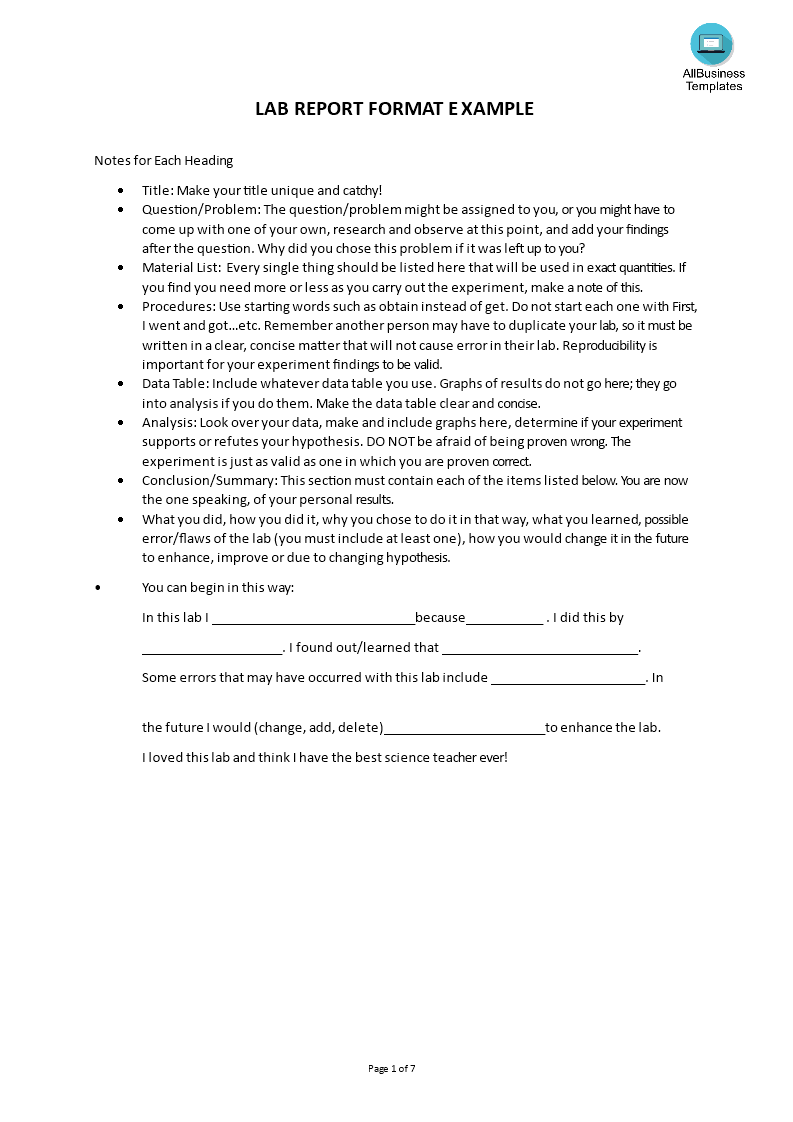Formal Science Lab Report Template
Save, fill-In The Blanks, Print, Done!

Download Formal Science Lab Report Template
Microsoft Word (.docx)Or select the format you want and we convert it for you for free:
- This Document Has Been Certified by a Professional
- 100% customizable
- This is a digital download (81.28 kB)
- Language: English
- We recommend downloading this file onto your computer.
How do you write a lab report? We provide a Formal Science Lab Report format that fits your needs!
In a professional career in the lab, it often is required to make an academic or professional lab report. Research or lab reports serve several functions, depending on the purpose. They may be used to communicate information within an organization upwards to senior management, downwards to staff, or externally to government regulators. They can be informative or persuasive in nature, for example, to get the management or project board motivated to take the desired action, support a project, or approve an investment decision. This formal lab report handout will provide you with an outlined structure for writing reports. The following steps are important to follow when composing your report:
- Preparing and planning: the audience and the purpose
- Periodic reports;
- Progress reports;
- Investigative reports;
- Recommendation reports;
- Feasibility reports.
- Telling or selling: informational vs. analytical reports
- Constructing the message: the report structure
- Caring for your reader: empathetic vs. selfish writing
- Using effective language: formality, jargon, and details
- Delivering the message to the reader: indirect vs. the direct method
- Enhancing readability: Using headings, transitions, and graphics
- Identify the purpose of the report
- Make sure you understand the wishes and needs of your audience;
- Understand the difference between informational and analytical reports;
- Develop an effective report format, before you start writing the content;
- Decide on what language and level of detail is appropriate for your target audience;
- Apply an appropriate degree of formality to your report, and keep it consistent;
- Determine if the direct or indirect method is appropriate for your target audience;
- Create headings, transitions, and graphics to enhance your report’s readability;
- Arrange proofreading of the report before sending it to the final readers.
Lab Report Format School
- Outline for all Formal Lab Reports:
- Title:
- Question/Problem:
- Hypothesis:
- Material List:
- Procedures:
- Data
- Table:
- Analysis:
- Conclusion/Summary:
- Notes for Each Heading
- Title: Make your title unique and catchy
- Question/Problem: The question/problem might be assigned to you, or you might have to come up with one of your own, research and observe at this point, and add your findings after the question.
- Research Question
- Background Information
- Hypothesis (if applicable)
- Variables
- Control of Variables
- Materials
- Method (Procedures)
- Data Collection and Processing
- Raw Data
- Processed Data
- Uncertainty
- Presentation and Graphs
- Conclusion and Evaluation
- Improvements
- References
As you know, communicating in a professional manner will get you respect and will bring you new opportunities in life and business. Therefore, we support you by providing this Formal Lab Report template and you will see you will save time and increase your effectiveness. Please note this template is provided for guidance only. Letters and other correspondence should be edited to fit your personal situation.
Download this Science Lab Report template now.
DISCLAIMER
Nothing on this site shall be considered legal advice and no attorney-client relationship is established.
Leave a Reply. If you have any questions or remarks, feel free to post them below.
Related templates
Latest templates
Latest topics
- Christmas Templates
It's Christmas... Be prepared with nice Christmas letters, invitations, social posts etc and check out these Christmas templates now! - GDPR Compliance Templates
What You Need To Be DPR compliant? Are you looking for useful GDPR document templates to make you compliant? All these compliance documents will be available to download instantly... - Google Sheets Templates
How to work with Google Sheets templates? Where to download useful Google Sheets templates? Check out our samples here. - Drop Shipping Agreement
How to start drop shipping? Do you need a Drop shipping Agreement? Check out our Dropshipping Agreement templates now! - Excel Templates
Where to find usefl Excel templates? How do I create a template in Excel? Check these editable and printable Excel Templates and download them directly!
cheese

